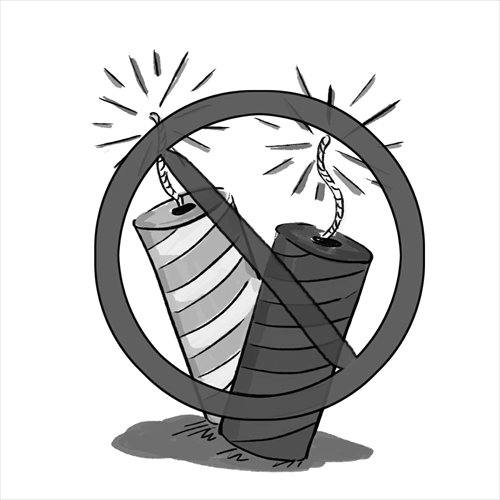
Illustrations: Chen Xia/GT
Chinese Lunar New Year was this month, but nobody in Shanghai would ever know it, as not a single firecracker was heard nor a single firework seen. Giving new meaning to the carol "Silent Night," our city surely did sleep in heavenly peace while law enforcers worked round the clock to uphold a new ban on flammable festivities.
The next morning, sanitation workers were seen leaning idly on their brooms rather than sweeping up mountains of red paper. Firefighters also reported that there were no emergencies and hospitals no burn patients. All in, it was the single most quiet, clean and peaceful Spring Festival in Shanghai history.
What a far cry from just last month when local residents and even the media laughed at the plausibility of banning China's most identifiable and deep-rooted tradition. How, everyone asked, could Shanghai possibly outlaw a time-honored custom that has existed since 200BC, when people believed that baozhu (literally "exploding bamboo") frightened away evil spirits?
Even the Global Time's own commentary [See: "Shanghai's firework ban makes sense, but how to enforce it?" 2016-1-10] doubted that local authorities had the wherewithal to uphold the new policy or that 25 million residents would be willing to respect the regulations. After all, Shanghainese citizens are not exactly known for abiding by the law nor are local police very diligent about chasing down law-breakers.
Many cited the city's ineffective ban on smoking cigarettes in public venues and our laughably lax traffic rules as examples of people here doing what they want regardless of the law. Some of Shanghai's policies, they said, are just "posturing" and the city's police "impotent." If any city in China could enforce a ban on fireworks, netizens mocked, "spineless Shanghai" would be at the bottom of the list.
I myself spent new year's eve in my hometown in neighboring Zhejiang Province, but I couldn't fall asleep due to the arsenal of fireworks that villagers persistently set off until dawn. So I browsed Weibo and WeChat, eager to hear how my friends back in Shanghai were handling the annual all-night assault. Misery loves company! Imagine my envy when not a single one of them had anything to complain about.
So why did the ban go so right? If you'll recall, back in 2013 Shanghai's air pollution quintupled in the first hours of the lunar new year as a result of literally millions of people lighting off fireworks. But with Shanghai continuously being blanketed in smog and multiple AQI alerts for 2015, local residents finally lost their tolerance for pollutants.
Undeniably, most of the praise goes to the people. Rather than approaching the new law from the top-down, which rarely works in Shanghai, local leaders brilliantly turned it into a grassroots campaign whereby citizens themselves would participate in the policing of their own communities. Neighborhood councils formed volunteer groups to patrol compounds, paste notices and even offer rewards for reporting ne'er-do-wells. Fines of 100 yuan ($15) were strictly issued, vendors had their fireworks caches confiscated and the media amiably reported these instances as warnings to others.
For all intents, it was the perfect example of residents and leaders cooperating to uphold the law. But my barber, a very wise migrant worker from Anhui Province, raised a profound point during my most recent haircut. Imagine, he asked, how safe and secure Shanghai could become if this type of conscientious cooperation was applied to all of the other ineffective laws in this city, such as traffic violations, polluting factories and governmental corruption?
Indeed, Shanghai's long chain of rules and regulations is only as strong as its weakest law enforcement link. But with citizen involvement, together we can keep our city great.
The opinions expressed in this article are the author's own and do not necessarily reflect the views of the Global Times.

